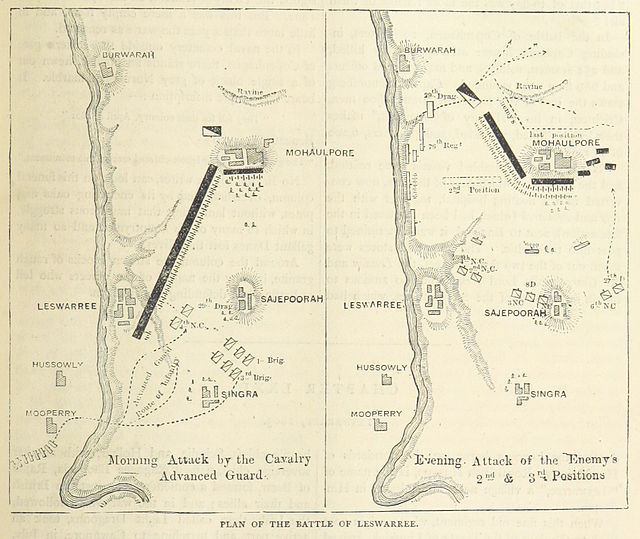Introduction
The Battle of Laswari, fought on November 1, 1803, is famously referred to as one of the most crucial conflicts during the Second Anglo-Maratha War. It demonstrated the military strength of the company established in Britain in India and served as a crucial point in the history of colonization in that region. Therefore, the question arises: what was the tragedy in this fight? By the way, let’s think about this.
Significance of the Battle of Laswari
The Battle of Laswari took place as a conscious shift of power relations in northern India happened during the first two decades of the 19th century. The win was a significant plus for the British, as it affixed their power over the more significant parts of the Indian region and mainly diminished the Maratha Empire.
Historical Context
Furthermore, to obtain a deep-seated grasp of the Battle of Laswari, we are required to analyze the broad historical context.
The Second Anglo Maratha War
The war was the second Anglo-Maratha conflict, a turning point between the British East India Company and the Maratha Empire. This might be a brighter star in the sky of the remarkable survival struggle for supremacy in India, with both parties fighting for rule over India.
The Maratha Empire in the Early 19th Century
In its imperial splitter, the Marathas Empire is considered among the most influential states in the Indian subcontinent in the early 19th century. However, internal tensions and the emergence of the East India Company undermine the company’s position.
Prelude to the Battle
The period of the pre-Battle of Laswari was characterized by strategic maneuvers from the British and the Marathas’ sides and by essential events.
Key Players: British East India Company and the Marathas
On one hand, there was the British East India Company, with its eyes fixed on efficiency and domination. However, the other angle to this account was the Marathas, who were determined to have their sphere of influence and were led by Daulat Scindia.
Strategic Importance of Laswari
Laswari was in a critical place in the scheme of things. To yield control over such an area is imperative for logistics and means of movement; therefore, it means a lot for the army.
The Commanders
This event turned out to be a decisive one for the leadership factor.
British Command: General Gerard Lake
General Gerard Lake, a seasoned, innovative politician, led the British troops. He significantly contributed to the British triumph by leading the troops on the battlefields and applying brilliant tactics.
Maratha Command: Daulat Scindia
Daonath Scindia, the foremost Maratha, administered the Maratha forces. In contrast to his efforts, the Marathas still failed to outmaneuver the British in their tactics.
Battle Tactics and Strategies
Knowing what moves both sides use to strategize, you can learn how it all started.
British Military Tactics
The British strategy comprised the close collaboration of infantry foot soldiers, artillery, and distinctive cavalry attacks. They quickly adjusted to combat and environmental agencies and ga, which were real and vantage.
Maratha Military Strategies
The deprivation of time precedes the Marathas by reviving the original tactics, and they extensively relied on their cavalry. On the other hand, they appeared to need to be better equipped and organized when opposed to the well-disciplined and up-to-date adversaries, the British Team.
The Battle Begins
It all took off with the engagements, and the direction of the fighting scene was that of a severe battle.
Initial Skirmishes
Meetings ranged from small operations, where the parties tried to feel their opponents’ weak points and strengths, to large ones, where they tried their own in action. Therefore, finally, I have reached the play’s central conflict, which has begun with these encounters.
Major Phases of the Battle
In such a battle, such division often could result in systemic division and conflict. Proceed through a succession of steps where they have a confrontation upcoming. In the two bouts, they encounter. While most British forces on the battlefield were withdrawn to shore up other sections, some local troops remained and continued their struggle by attacking these critical locations. Moreover, it was prudent to separate each controversy into the rational part. Russia seems to have broken the fighting sequence into several stages, alternately with the shooting phase as the regeneration phase.
Turning Points
Certain moments in the battle were pivotal in determining the outcome.
Decisive Moments
The commanding moment was when the bravado of the British cavalry had led to a formidable charge that tore through Maratha lines and resulted in amalgamation.
Key Tactical Moves
Another key move was the British artillery’s precision targeting, which decimated Maratha defenses and morale.
Aftermath
The consequences of the Battle of Laswari were immediate and far-reaching.
Immediate Consequences
The British command sank their fangs in the realm and captured several vital territories in one swoop, weakening the Maratha dynasty.
Long Term Impact on the Maratha Empire
In the long term, the defeat at Laswari marked the beginning of the end for the Maratha Empire, leading to further losses and eventual subjugation by the British.
Historical Significance
The Battle of Laswari had profound implications for the future of India.
Impact on British Expansion in India
This victory was a significant milestone in British expansion, consolidating their control over northern India and paving the way for further conquests.
Changes in Indian Political Landscape
The Marathas’ defeat caused a change of fortunes, which brought about a refiguring of alliances and enabled the British to grasp power in Indian politics.
Legacy
The legacy of the Battle of Laswari continues to be remembered in various ways.
Commemoration and Memorials
Memorials and commemorations of the battle highlight its significance and honor those who fought.
The Battle’s Place in Indian History
The battle is prominent in Indian history, symbolizing the decline of Maratha power and the rise of British rule.
Conclusion
‘The Battle of Laswari’ was not merely a military combat; this battle was one of the bitter experiences that changed the very history of India. The bravery and tactics used on either side are closely looked at to this day for lessons learned and remembering. This clash of arms led to a clear-cut assertion of dominance by Britishers, resulting in British colonial rule and the consequent fate change of the Indian subcontinent.
FAQs
What was the Battle of Laswari?
The Laswari battle, which occurred during the Second Maratha) War became prominent in the British East India Company’s battle with the Maratha Empire on November 1.
Who were the principal commanders in the Battle of Laswari?
The British army had General Gerard Lake as its commander, while the Maratha army had Daulat Scindia in character as its commander.
Why was the Battle of Laswari significant?
It was, hence, a key battle that resulted in a decisive victory for the Britains and considerably weakened the power of the Maratha Empire, which in turn contributed to the strengthening of the British over India.
What did the British use as the main tactics?
The British emphasized dismal infantry formations, well-honed artillery barrages, and showy cavalry charges.
What did the Marathas use as the main tactics?
The Marathas mostly used their horse but failed when the English, who had prepared in an organized and modern way, made their tactics.
What were the immediate consequences of the battle?
The subsequent British took over control of the strategic positions and broke down the struggle of Maharatha.
How did the Battle of Laswari impact the Maratha Empire in the long term?
It indicated the start of the end for the Maratha Empire and was the beginning of the series of defeats that ultimately resulted in the British Empire’s subjugation.
How did the Battle of Laswari affect British expansion in India?
This event was a breakthrough in British ascendancy in northern India and led to further conquest.
Are there any memorials commemorating the Battle of Laswari?
Yes, some memorials and other activities pay tribute to the importance of the fight and the ones who engaged in it.
What is the legacy of the Battle of Laswari?
The war represents a signpost in Indian history, marking the waning of the Maratha hegemony and the British pre-eminence.

